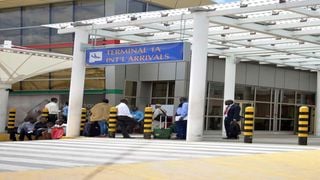
The Jomo Kenyatta International Airport.
News
Premium
State bureaucrats spent Sh3bn on foreign trips in Covid year
Government officials spent Sh3 billion on foreign trips this year despite Covid-19 travel restrictions, exposing spending excesses as the State struggled to fund key development programmes.
A report from the Controller of Budget (COB) for the 2020/21 financial year shows the Ministry of Foreign Affairs was the top spender on trips abroad, using 40 per cent of the total travel expenditure.
As the ministry splurged Sh1.21 billion on these trips, Members of Parliament were the second largest spenders on trips abroad, using Sh823 million in the year to June.
Other top spenders on foreign trips were the Parliamentary Service Commission, which used Sh432 million; Parliamentary Joint Services (Sh161 million); the Ministry of East African Community (Sh47 million); and the Ministry of Tourism (Sh28 million).
Others were the Ministry of Trade (Sh30 million); National Treasury (Sh20 million); Ministry of Interior and Citizen Services (Sh23 million); and the Office of the President (Sh84 million).
But government spending on foreign trips dipped slightly from the previous year, when Sh3.8 billion was used.
This profligate spending is happening as government outlays for salaries, allowances and other recurrent expenditure are growing while development spending has shrunk as a share of the national budget, squeezing funding for key development programmes.
Recurrent expenditure grew to 68.1 per cent (Sh2.34 trillion) of the budget last year, up from 64 per cent (Sh2.02 trillion) in FY 2019/20, while development expenditure shrank to 20.7 per cent (Sh705 billion) from 24 per cent (Sh762 billion) in the previous year.
Controller of Budget Margaret Nyakang’o has recommended that the government stop borrowing to finance these growing recurrent expenditures and bring more people into the tax base to increase revenues.
Dr Nyakang’o said the government should defer new projects and instead complete stalled ones and clear national government pending bills that have hit Sh36.3 billion.
“To check on the burden of public debt and other related fiscal strains, the government should enhance collection of domestic taxes to expand fiscal space and ensure borrowings are used only for financing development expenditure and not for recurrent expenditure and at the minimum cost to reduce the high cost associated with debt repayment,” Dr Nyakang’o said.
“Further, the Controller of Budget recommends that the government take stock of all ongoing and stalled projects, provide funds to finish them, and defer any new projects to curb the accumulation of pending bills.
“In addition, the government should oversee coordination of all joint projects between the two levels of government to avoid duplication of projects aimed at accomplishing similar objectives.”
The report shows the Teachers Service Commission (TSC) retained its spot as the runaway top spender of recurrent expenditure, using Sh274.88 billion in the year to June, followed by the Ministry of Interior (Sh127.5 billion) and the Ministry of Defence (Sh112.44 billion).
Others are the State Department for Early Learning and Basic Education (Sh85.93 billion); Department of Infrastructure (Sh59.96 billion); Department for University Education and Research (Sh55.34 billion); and the Ministry of Health (Sh52.13 billion).
In total, ministries, departments and agencies spent Sh14.23 billion on both local and foreign travel, Sh7.47 billion on rent and Sh4.39 billion on hospitality, while salaries, wages and allowances in the year to June hit Sh489.07 billion, which is 42.4 per cent of the gross recurrent spending.





